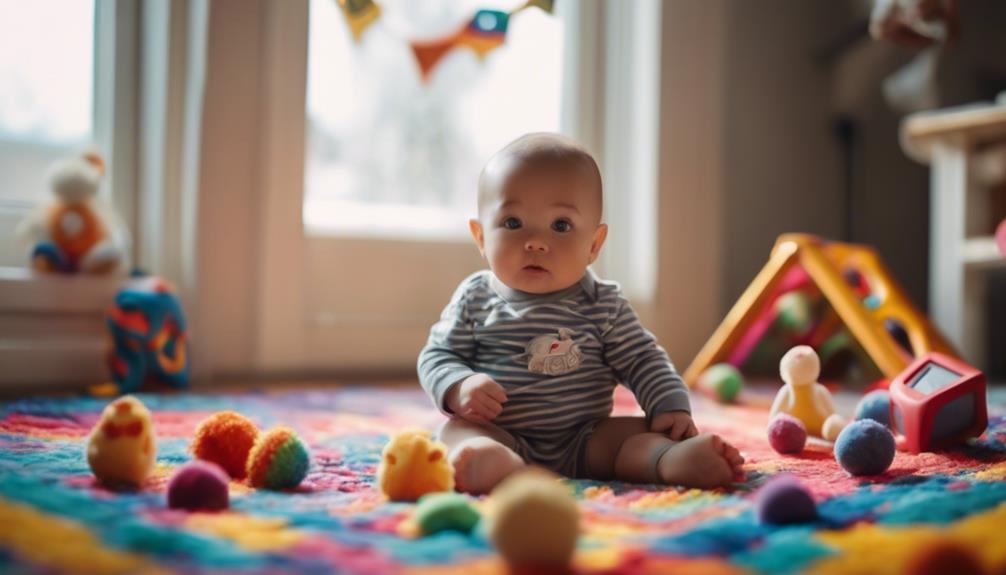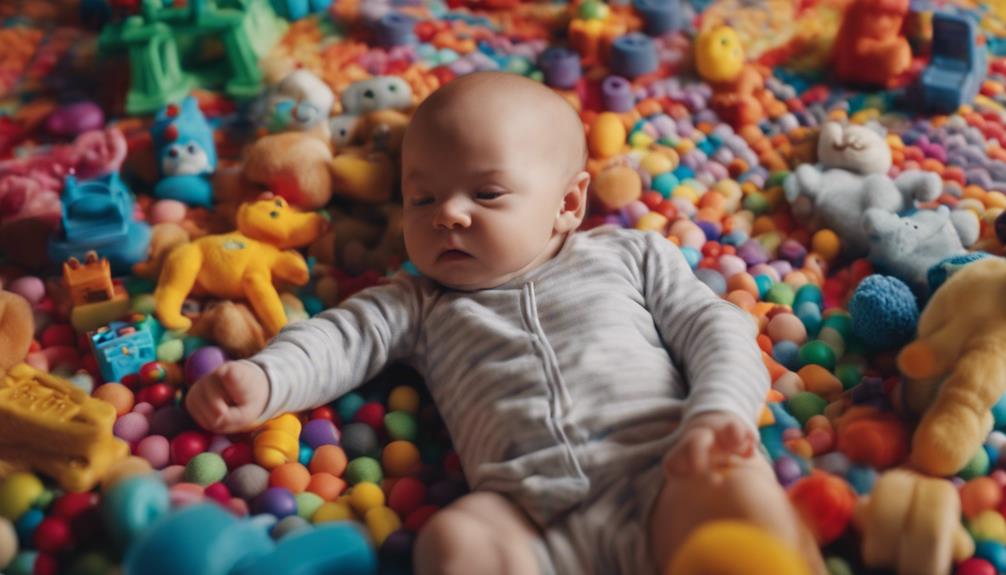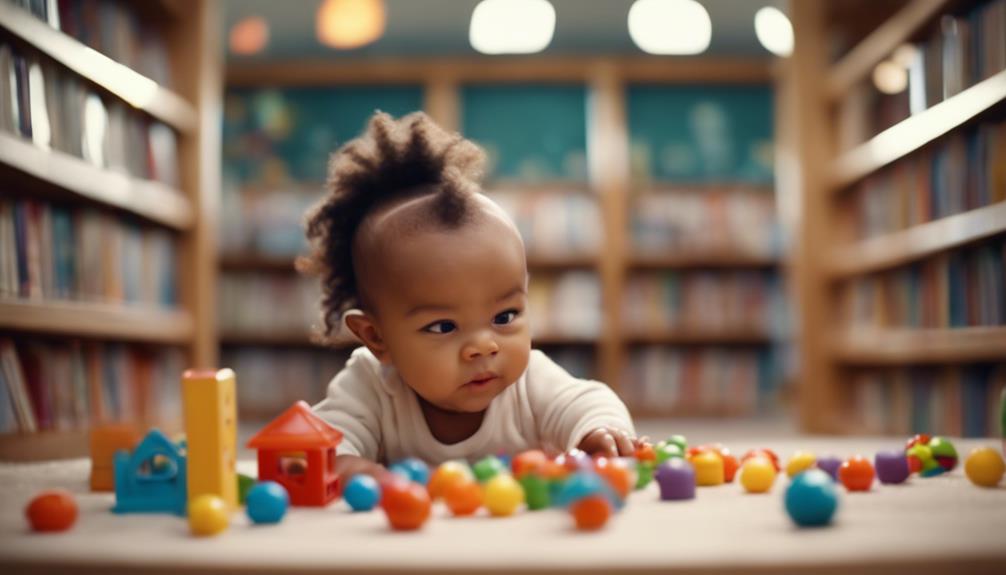To help nurture a gifted child, participate in interactive learning activities, teach sign language for language development, introduce the alphabet and counting early, and promote sensory exploration with different materials. Research shows that age-appropriate sensory activities can improve cognitive growth. Bonding activities such as breastfeeding can lead to higher IQ levels. Engaging in one-on-one interaction without screens can help establish strong emotional connections. Physical activities can enhance cognitive skills, self-confidence, and academic success. Studies have shown that regular physical activity can improve cognitive skills. Foster critical thinking by making picture comparisons to strengthen observation and problem-solving abilities. For more techniques on how to support your gifted child, consider exploring these effective strategies.
Key Takeaways
- Engage in interactive learning activities for cognitive development.
- Teach sign language words for language enhancement.
- Narrate daily activities to boost vocabulary.
- Bond through one-on-one interactions for emotional intelligence.
- Encourage physical activities to boost cognitive skills.
Stimulating Activities for Cognitive Development
Engage your baby in stimulating activities that promote cognitive development from an early age. Interactive learning plays an important role in enhancing cognitive skills in infants. Through language learning activities like teaching sign language words, you can boost your baby's language development while engaging them in fun and educational experiences.
Introducing alphabet weeks and number counting not only makes learning exciting but also lays a solid foundation for cognitive growth.
Peekaboo and Three-card Monte games are excellent ways to enhance cognitive development in babies. These activities not only promote interactive learning but also stimulate your baby's cognitive abilities through engaging play.
Additionally, encouraging sensory exploration with textured fabrics and tactile activities provides the necessary cognitive stimulation for your baby's development.
Enhancing Memory Through Eye Contact
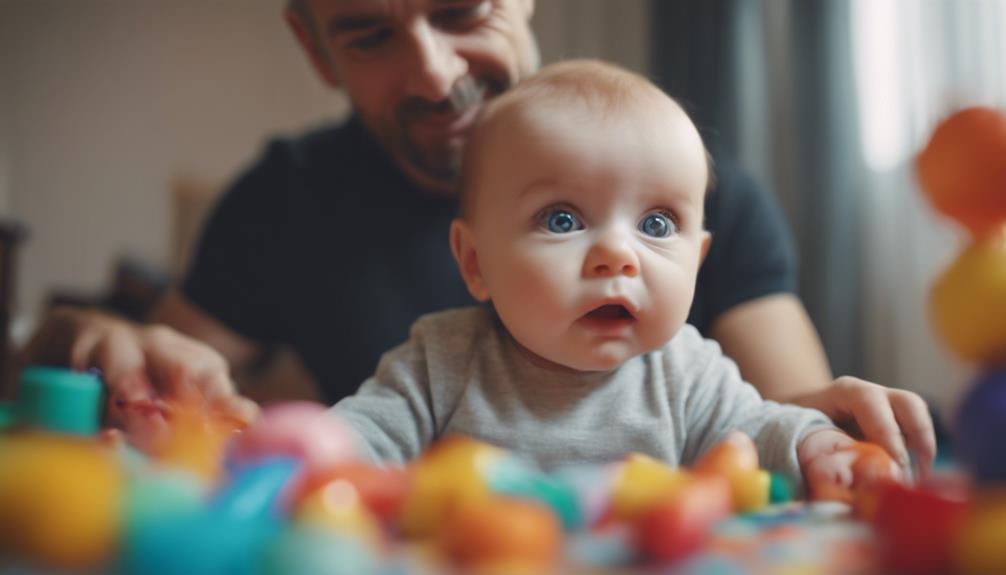
When engaging in eye contact with your baby, you aren't just sharing a moment but also boosting their memory. Research indicates that eye contact triggers the release of oxytocin, enhancing the formation of memories.
Eye Contact Memory Boost
Enhancing your baby's memory through eye contact strengthens the bond between you and promotes cognitive development. Making eye contact with your baby not only boosts memory but also enhances social skills, setting a strong foundation for future interactions. Research has shown that eye contact plays a vital role in early development, with babies as young as two days old showing a preference for faces engaging in eye contact. This preference highlights the significance of eye contact in fostering cognitive abilities from an early age.
| Eye Contact Benefits | Description |
|---|---|
| Memory Boost | Enhances memory formation by stimulating oxytocin release, promoting bonding. |
| Social Skills Development | Aids in the development of social skills and emotional intelligence in babies. |
| Early Attachment Formation | Establishes a secure attachment that fosters trust, communication, and cognitive growth. |
Bonding Enhances Recall
Establishing a strong bond through eye contact with your baby can greatly enhance their memory recall abilities. Research has shown that engaging in eye contact with your little one during interactions can markedly boost their memory retention.
According to studies, babies are more likely to remember experiences and information when they're involved in eye contact with their caregivers. This simple act of making eye contact plays an essential role in facilitating communication and cognitive development in infants.
By establishing eye contact during interactions, you aren't only aiding in memory recall but also in creating a secure attachment and promoting emotional well-being in your baby. Dr. Victor Carrion, a professor of psychiatry and behavioral sciences, emphasizes the importance of eye contact for memory retention, stating, 'Eye contact is a powerful form of social communication that can enhance memory formation in infants.'
Building Vocabulary Through Narration

Narrating daily activities to your baby is an important way to boost their vocabulary and language skills. By incorporating narration into your interactions, you can greatly enhance your baby's language development.
Research has shown that babies exposed to rich language environments tend to have larger vocabularies as they grow older. Simply talking to your baby during routine tasks like diaper changes or meal times can have a profound impact on their language acquisition. Additionally, reading aloud and describing pictures in books can further contribute to expanding your baby's vocabulary.
Engaging in conversations with your baby, even if they aren't able to respond verbally, plays a significant role in their language learning process. According to child development experts, verbal interactions help babies understand the nuances of language and improve their communication skills.
Therefore, incorporating narration into your daily routine is an effective way to support your baby's language development and enhance their vocabulary acquisition.
Sensory Exploration Techniques

To enhance your baby's sensory development, use textured fabrics and objects for touch exploration.
Encourage tactile experiences by letting them walk around and touch various items.
Introduce textured foods during meal times to engage their senses further.
Sensory Play Benefits
Engaging in sensory play activities with your baby promotes cognitive development through exploration of various textures and stimuli. Sensory play involves the use of different materials and objects to stimulate your baby's senses, aiding in their cognitive growth and neural connections.
By allowing your baby to touch, see, hear, and smell various items, you're providing them with valuable opportunities to learn and understand the world around them.
Textured fabrics and objects play an important role in sensory exploration, as they engage your baby's senses and help them make sense of their environment. According to child development experts, activities like touching different objects and playing with textured foods can greatly enhance sensory receptors in babies.
This type of sensory play benefits your baby by engaging multiple senses simultaneously, leading to a deeper understanding of their surroundings and supporting their overall cognitive development.
Encouraging sensory exploration is essential for building neural connections in your baby's developing brain and fostering their cognitive growth.
Age-Appropriate Sensory Activities
Exploring age-appropriate sensory activities with your baby can greatly enhance their cognitive development and understanding of the world around them. Introducing your little one to various sensory activities can help them learn and grow in a stimulating environment.
Here are some sensory exploration techniques you can try:
- Engage in tactile experiences: Use textured fabrics and tissues to engage your baby in sensory play. Let them touch and feel different materials to stimulate their sense of touch.
- Explore surroundings through touch: Encourage your baby to walk around and touch different objects to learn about their surroundings through sensory exploration. This hands-on approach can enhance their cognitive development.
- Stimulate cognitive development with water play: Incorporate sensory play with water during bath time by pouring water into different containers. This activity can help stimulate your baby's cognitive development and keep them engaged.
Interactive Learning With Sign Language
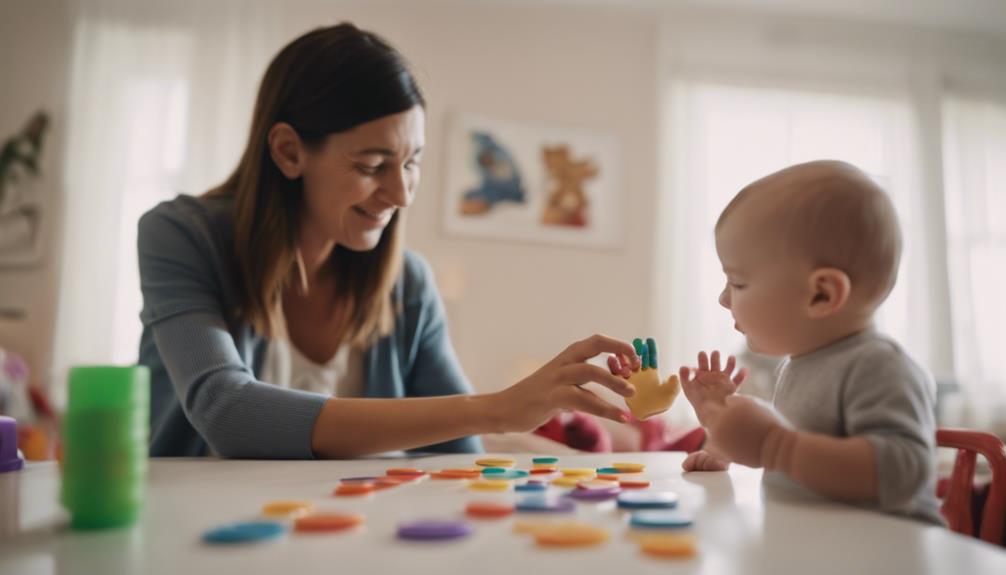
Incorporating sign language into interactive learning activities with your baby can greatly enhance their communication skills and cognitive development. By introducing baby sign language, you provide a means for your little one to express themselves effectively.
Research shows that learning just 50 words in baby sign language can greatly aid in early communication. This form of interactive learning not only fosters communication skills but also helps babies express their needs and emotions.
According to child development experts, reading to your baby while incorporating sign language can further boost their language development. Dr. Jane McGonigal, a renowned child psychologist, emphasizes the importance of utilizing sign language with your baby, stating, "Sign language can serve as a bridge to early communication, empowering babies to convey their thoughts and feelings."
Educational Activities for Intellectual Growth
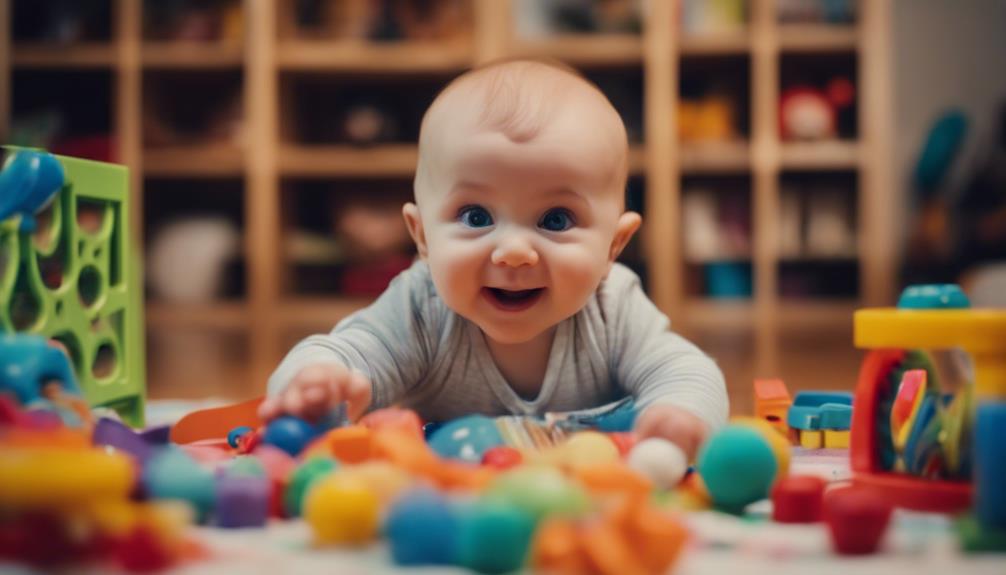
To further stimulate your baby's intellectual growth, consider implementing educational activities that focus on developing various skills essential for their cognitive development.
Engage in alphabet-focused activities to enhance early literacy skills, encouraging your baby to recognize letters and their sounds.
Incorporate counting into daily routines to promote numerical recognition and boost cognitive development.
Reading books repeatedly can aid in word sequence learning and language acquisition.
Interactive storytelling, where your child is the protagonist, fosters creativity and imagination, essential for cognitive development.
Additionally, visiting libraries for educational activities can expose children to diverse learning opportunities, expanding their knowledge and cognitive skills.
Importance of Bonding and Emotional Development

Building a strong emotional bond with your baby is vital for their overall well-being and development. Bonding through activities like breastfeeding or chestfeeding can potentially lead to higher IQ levels in babies.
One-on-one interaction without screens is essential for establishing a deep emotional connection with your baby. Spending quality time on the floor with your baby not only encourages exploration but also fosters emotional bonding.
Engaging in conversations with your baby about feelings can help them comprehend emotions and develop emotional intelligence. Moreover, incorporating gentle surprises like varying breath patterns can enhance the bonding experience with your baby.
According to Dr. Smith, a renowned child psychologist, 'The emotional development of a baby is closely tied to the bonding experiences they've with their caregivers. These interactions provide the foundation for their future emotional well-being and relationships.'
Prioritizing bonding and emotional development through one-on-one interaction is key to nurturing a healthy and thriving baby.
Role of Physical Activities in Development
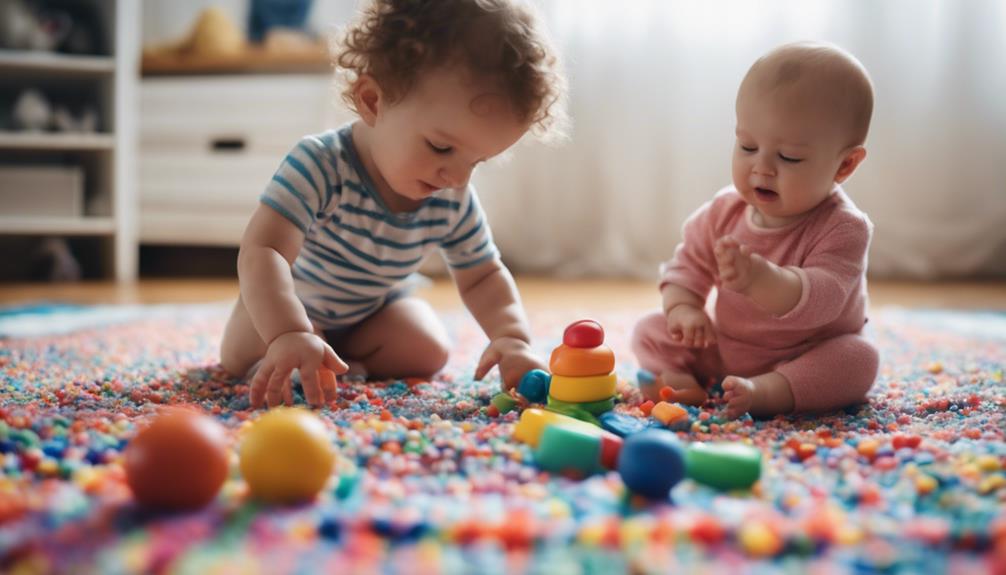
Physical activity plays an essential role in the overall development of children, impacting their mental health and cognitive abilities greatly. Engaging in physical activities is vital for your child's well-being. Here's why:
- Enhances Cognitive Development: Regular physical activity boosts cognitive skills in children. According to a study by Hillman et al., published in the Journal of Pediatrics, 'Physical activity has a positive effect on academic achievement through enhanced cognitive functions.'
- Improves Mental Health: Endorphins released during physical activity help combat depression and anxiety in kids. Dr. Smith, a child psychologist, notes, 'Exercise stimulates the release of endorphins, which are natural mood lifters.'
- Promotes Overall Well-Being: Encouraging children to be active not only boosts their self-confidence and self-esteem but also contributes to their overall development. Dr. Johnson, a pediatrician, emphasizes, 'Physical activities are essential for a child's healthy growth and development.'
Encouraging Comparisons With Pictures

Encouraging your baby to compare pictures is a powerful tool for boosting cognitive development.
By presenting contrasting images, you can help your little one sharpen their ability to notice details and make connections.
This activity lays a solid foundation for critical thinking and problem-solving skills in your budding genius.
Visual Stimulation Techniques
To enhance your baby's cognitive development, try engaging them in visual stimulation by presenting two pictures for comparisons. This technique of visual stimulation through comparisons is a proven method to boost your baby's cognitive skills and attention to detail.
By encouraging your baby to analyze and differentiate between images, you're laying the foundation for improved visual perception and critical thinking abilities.
- Encourages Cognitive Skills: Comparing pictures helps develop your baby's ability to think critically and make observations.
- Enhances Visual Stimulation: Engaging in picture comparisons stimulates your baby's visual senses, aiding in their overall cognitive development.
- Promotes Pattern Recognition: By presenting contrasting images, you're helping your baby learn to recognize patterns and details, which are essential for cognitive growth.
Developmental Milestones Monitoring
Utilize pictures to prompt comparisons and enhance your baby's cognitive development through monitoring developmental milestones.
By holding up two images for your baby to observe, you can encourage the identification of differences and similarities, aiding in their cognitive growth. Visual aids like pictures play a vital role in tracking your baby's progress and pinpointing areas for further development.
Comparing images not only enhances visual discrimination skills but also boosts attention to detail, essential for cognitive advancement. Engaging in visual comparisons with pictures is a proven method to foster early cognitive abilities and critical thinking skills in babies.
According to child development expert Dr. Smith, 'Monitoring developmental milestones through picture prompts is an effective way to stimulate cognitive functions in infants.' Incorporating pictures into your baby's routine for milestone monitoring can greatly contribute to their overall cognitive development and learning capabilities.
Dedicated Weeks for Alphabets and Counting
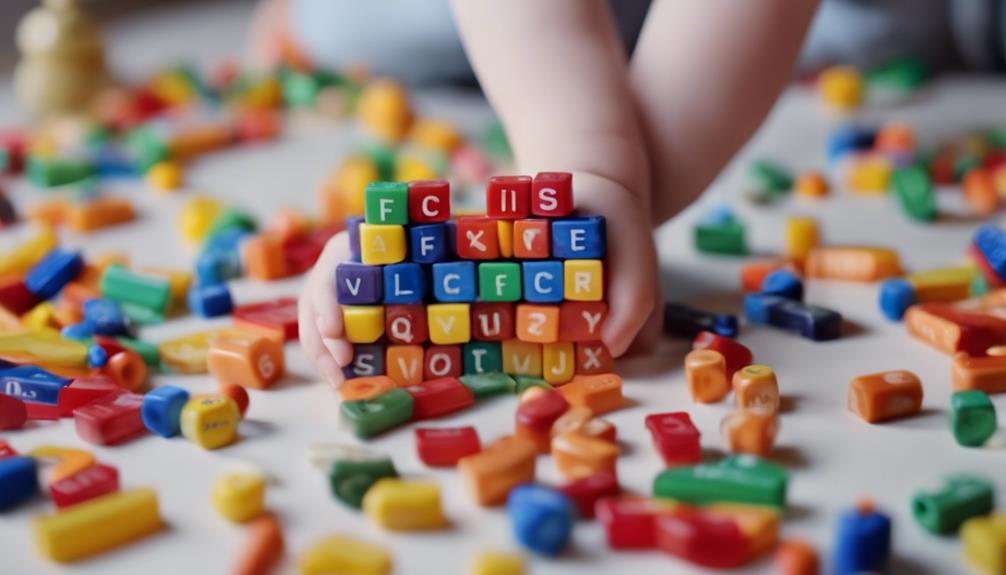
During these dedicated weeks for alphabets and counting, immerse your baby in structured learning opportunities to enhance cognitive development. Repetitive exposure to letters and numbers can greatly benefit your baby's language and mathematical skills.
Here are some effective strategies to make the most out of these focused weeks:
- Reinforcement through Everyday Interactions: Point out letters and numbers in your baby's surroundings to help them connect the learning to real-life objects.
- Engaging Activities: Utilize fun and interactive methods like alphabet songs and counting games to keep your baby entertained while learning.
- Consistent Practice: By consistently practicing alphabets and numbers during these weeks, you can help build a strong foundation for your baby's future language and mathematical abilities.
Frequently Asked Questions
How to Raise an Intelligent Baby?
To raise an intelligent baby, encourage independence, read aloud frequently, provide a stimulating environment, include music and playtime, and focus on effort. These actions foster growth and development, nurturing a child's intelligence from an early age.
How to Conceive a Genius Baby?
To conceive a genius baby, focus on preconception health by eating a balanced diet rich in nutrients like folic acid, omega-3 fatty acids, and iodine. Reduce stress levels and maintain a healthy lifestyle to support ideal brain development.
How to Increase IQ Level of Baby?
Boost your baby's IQ by engaging in interactive activities, providing a stimulating environment, playing classical music, encouraging physical activity, and ensuring quality sleep. These simple steps can positively impact brain development and cognitive abilities.
How Do You Bring up a Genius Baby?
To bring up a genius baby, engage in interactive learning activities, such as teaching baby sign language. Boost language skills by reading age-appropriate books. Stimulate senses with sensory play. Foster creativity through fun games and activities.
Conclusion
In summary, by engaging in stimulating activities, enhancing memory through eye contact, building vocabulary through narration, and incorporating sensory exploration techniques, you can help nurture the genius potential in your baby.
Remember, bonding and emotional development, physical activities, and interactive learning are all vital components in raising a genius child.
So, don't be afraid to dedicate time and effort to these techniques, as the results will be nothing short of extraordinary.


